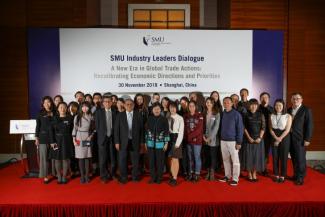
A day before the G-20 Summit in Argentina’s capital city of Buenos Aires, close to 100 business leaders and SMU alumni in China convened for a SMU Industry Leaders Dialogue themed “A New Era in Global Trade Actions: Recalibrating Economic Directions and Priorities”, held at the Shanghai Marriott Hotel City Centre on 30 November 2018.
Despite escalating tariff disputes between China and the US, the sentiment at the Dialogue on China’s economic outlook remained optimistic, with discussions focused largely on opportunities in the horizon for Chinese businesses and how they could expedite the government-led “Made in China 2025” programme.
Professor Lily Kong, SMU’s Provost officiated the Dialogue with a Welcome Address. Conveying SMU’s aim to deepen existing and develop new relationships with industry, institutions and the growing SMU alumni network in China, Professor Kong shared a vision to foster collaboration between China and SMU that delivers meaningful impact.

In the Faculty Conversation, Professor Locknie Hsu from SMU School of Law proposed a three ‘R’s strategy – re-prioritise, re-tool, and recognise – to help Chinese businesses acclimatise to the changing economic landscape. Quoting Charles Dickens, “It was the best of times, it was the worst of times…it was the spring of hope, it was the winter of despair...” – Professor Hsu urged industry players to explore new markets, upgrade skills, consider alternate avenues for revenue, and employ technology to facilitate cross-border trade.

Dr. Victor Fung, Group Chairman of Fung Group and Chair of SMU International Advisory Council in China, augmented the buoyancy potential for China in the Leadership Dialogue. He noted that “Made in China” applies mainly to products which are finished in China. Drawing from the “Flying Geese” model – where one economy can lead other economies towards industralisation – Dr. Fung encouraged Chinese businesses to consider migrating the product finishing process out to developing countries in Asia and Africa. He posited that the looming 25% tax could force Chinese manufacturers to briskly shore up their role in the supply chain and invariably help China achieve its 2025 vision sooner than expected. Lending a macroeconomic view, Dr. Fung shared concerns of a global recession, triggered by rising US inflation rates, should the increased tariff be imposed.

A distinguished panel comprised of Dr. Victor Fung; Mr. Michael Zhu, Chairman, Sunjoy Group Holdings Pte Ltd & Member, SMU International Advisory Council in China; Mr. Zhang Feiyan, Chairman of the Board of Directors, Shanghai Victory Group; and Professor Locknie Hsu was moderated by Professor Tan Chin Tiong, Senior Advisor, Office of the President & Professor of Marketing, SMU.
On whether Chinese consumerism would be enough to mitigate an economic recession in China, Mr. Zhu expressed his reservations and added that American consumption of products with components from China would likely continue. He urged Chinese businesses to be mindful of the competitiveness in the region, and indicated his bullishness on the manufacturing capabilities of China’s Asian neighbours. Mr. Zhu furthered that should anchor employers decide to pull their factories out of small Chinese towns, the rise in unemployment would also carry social repercussions. Dr. Fung proposed that in the mid-term, China could explore upgrading the qualifications of its workers to grow the service industry, and eventually tier up its workforce into higher-skilled roles in finance and technology.
Ending the Dialogue on a high note, Professor Locknie Hsu shared that to date, both China and the US have filed countersuits against each other with the World Trade Organisation (WTO), highlighting the presence of international governance over the dispute and injecting the possibility of mediation should the need arise.